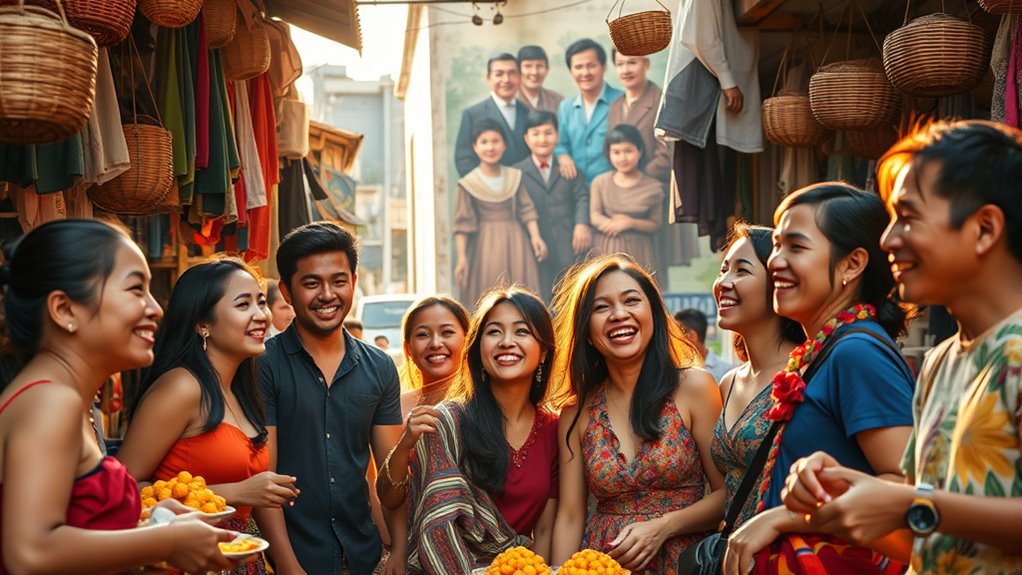Filipino history shapes modern relationships through a mix of traditional family values and colonial legacies. You’ll notice that respect for elders and familial cooperation are key, while colonial influences often create a tension between cultural authenticity and contemporary norms. Urban dating practices are evolving, with technology expanding connections, yet families still play a significant role in approving partnerships. Understanding this dynamic can give you insights into the complexities of love and connection in Filipino culture today.
Key Takeaways
- Colonial legacies influence modern relationship norms, affecting perceptions of worth and cultural authenticity in romantic contexts.
- Traditional family structures emphasize respect for elders, impacting communication and decision-making in contemporary relationships.
- Evolving gender roles from historical expectations shape shared responsibilities and egalitarian dynamics within modern family units.
- Urban dating trends reflect a blend of traditional courtship practices and liberal attitudes, facilitated by technology and changing social norms.
- Strong community support and empathy, rooted in Filipino history, enhance emotional intelligence in navigating modern relationships.
The Influence of Traditional Family Structures
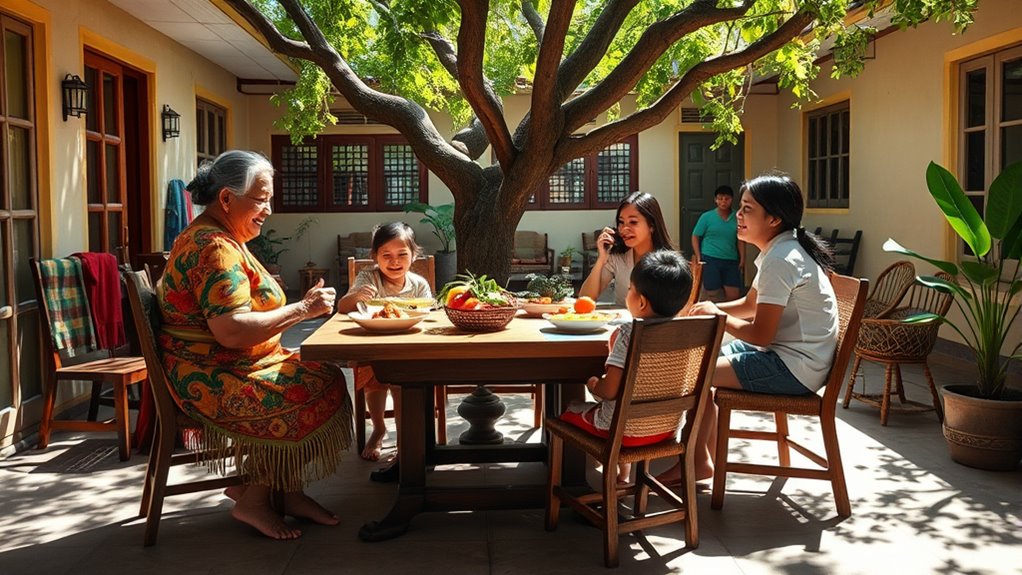
Although many aspects of Filipino culture have evolved, traditional family structures continue to play an essential role in shaping relationships today. You’ll notice that the hierarchical setup, with the eldest male often making significant decisions, influences daily interactions. Respect for elders is paramount, impacting how you communicate and relate to family members. The extended family, including aunts, uncles, and grandparents, not only provides authority but also strengthens community ties. You likely feel the weight of cultural values that emphasize family as the cornerstone of society, which can sometimes create power imbalances. Balancing these traditional expectations with modern independence can be challenging, yet these familial bonds remain a fundamental support system, grounding you in a rich cultural identity amid changing times.
Colonial Legacy and Its Impact on Relationships
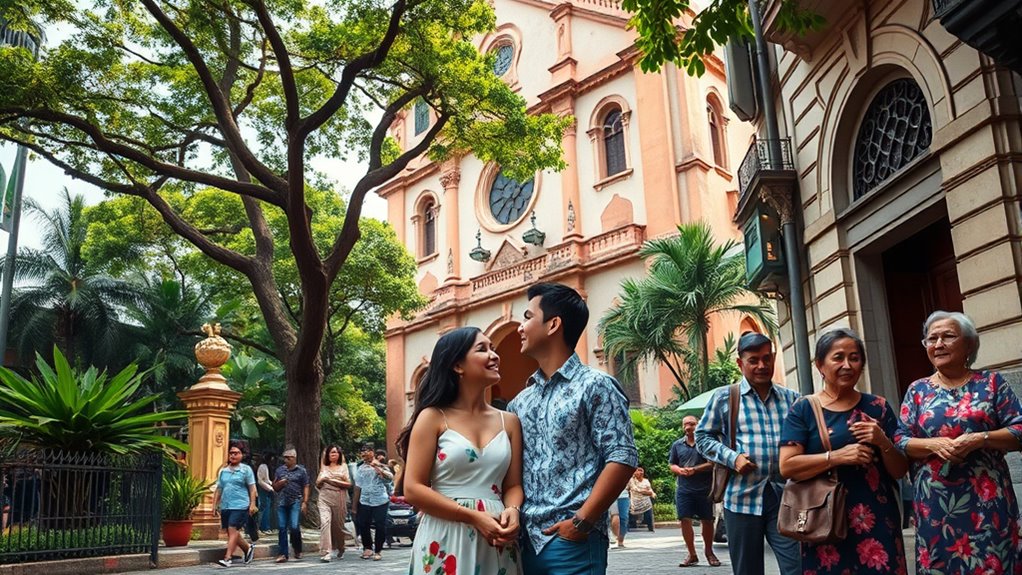
As the Philippines navigates its post-colonial identity, the influences of colonial legacy profoundly shape modern relationships. You might notice how English dominates conversations, impacting your connection with native languages and cultural identity. This linguistic imperialism can create a divide, making it hard to embrace your heritage fully. The prevalence of Western norms often overshadows traditional Filipino values, influencing dating behaviors and societal expectations. You might feel the pressure of a colonial mentality, especially in romantic contexts, where perceptions of worth are shaped by historical interactions. This dynamic is further complicated by the colonial rule that established English as the official language, contributing to the ongoing struggle for cultural authenticity. These dynamics complicate your relationships, as you balance modern influences with indigenous roots. Recognizing these legacies is essential for fostering healthier connections that honor both your past and present.
The Evolution of Dating Norms in Urban Areas

With urbanization transforming the landscape of Filipino society, dating norms are evolving rapidly. You’ll notice that traditional courtship practices still linger, especially in conservative areas, but younger generations are embracing more liberal attitudes, influenced by Western media.
In cities, the rise of dating apps like Tinder and Bumble makes meeting potential partners much easier, allowing you to explore relationships beyond traditional boundaries. Families often play a significant role in approving these relationships, yet many young adults engage in a trial phase to test compatibility.
This shift from traditional rituals to modern practices reflects a broader acceptance of diverse relationship forms, with urban areas leading the charge in redefining what dating looks like today.
Gender Roles and Modern Family Dynamics
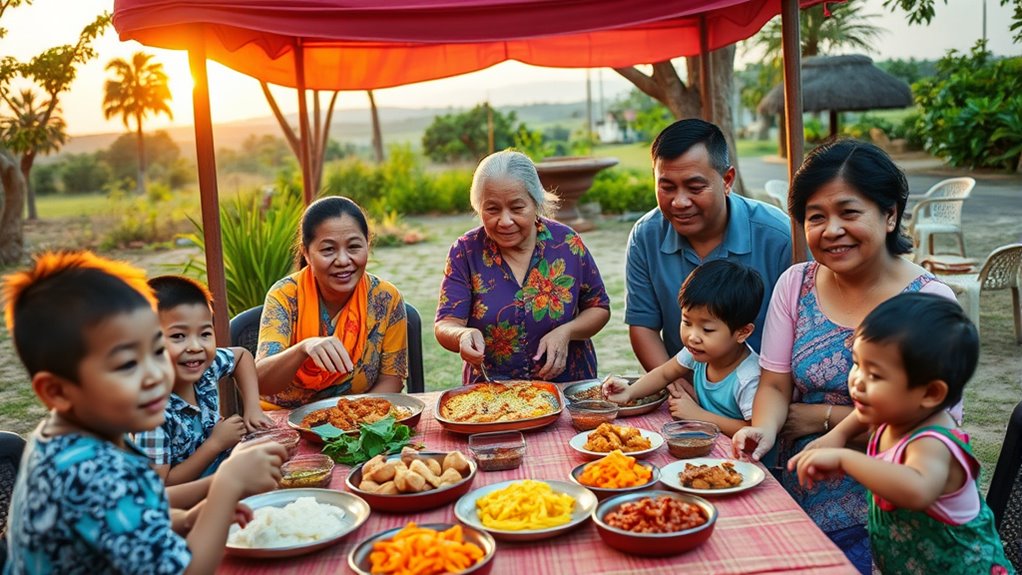
Urbanization not only reshapes dating norms but also substantially impacts gender roles and family dynamics in the Philippines.
Traditionally, men were viewed as providers while women managed the household, but this is changing. With more women entering the workforce, you’ll notice shared responsibilities in both domestic tasks and decision-making. This shift empowers women and encourages men to participate more in childcare.
The shift towards shared responsibilities in Filipino families empowers women and encourages men’s involvement in childcare.
Modern Filipino families are leaning towards egalitarian structures, fostering healthier relationships. Children observe these equal partnerships, nurturing their understanding of gender equality.
Despite these advancements, traditional values of family honor remain important. Balancing these evolving dynamics with cultural expectations presents both challenges and opportunities for growth in your family life.
The Role of Globalization in Shaping Relationship Perspectives
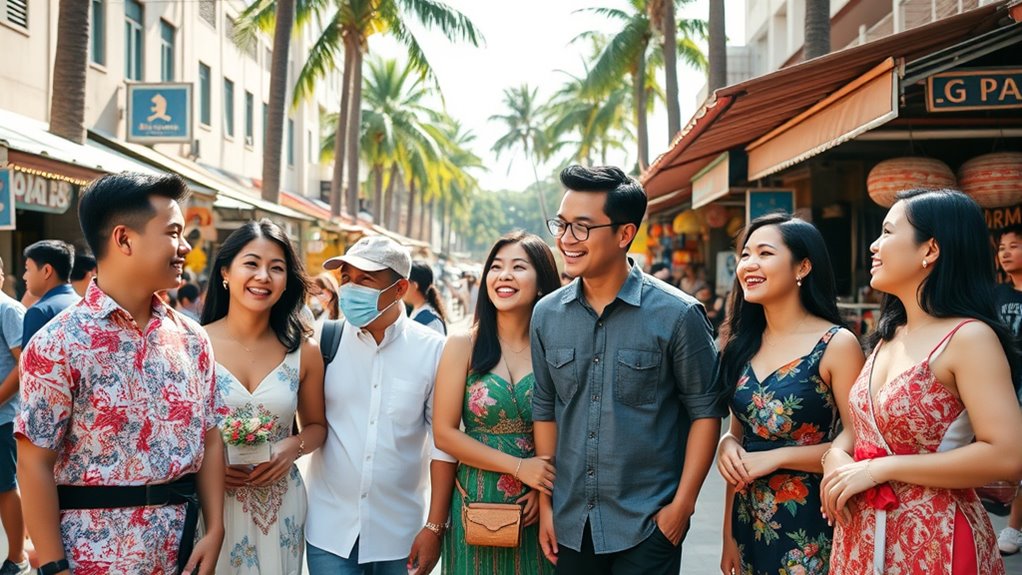
Globalization has greatly reshaped how you view relationships in the Philippines, blending traditional values with modern influences. Cultural diversity and Western ideals permeate your everyday interactions, often through social media and other digital platforms.
These advancements allow you to connect with family and friends across the globe, changing how you maintain those relationships. As you navigate these global networks, you might notice a shift toward nuclear family setups and an increase in intercultural partnerships.
Economic opportunities abroad also impact your dynamics, as remittances alter financial responsibilities within families. However, the widening income gap can strain relationships, introducing financial stress that affects stability.
Balancing Traditional Values With Modern Challenges
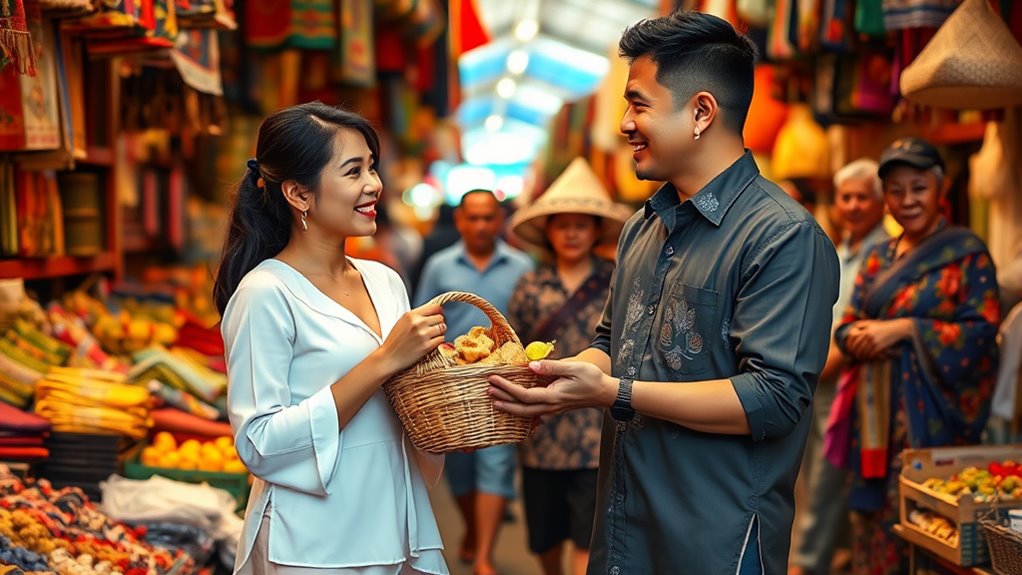
As you navigate the complexities of modern relationships, balancing traditional values with contemporary challenges becomes essential. Respect for elders and authority figures remains important, fostering harmony within families. Understanding the impact of emotional dysregulation can help in managing interpersonal conflicts that arise due to differing expectations.
Storytelling preserves cultural heritage, strengthening your familial bonds. Education is highly valued, serving as a pathway to success while encouraging your aspirations.
Storytelling enriches our cultural roots, while education paves the way for personal growth and future success.
However, you’ll encounter tensions between modern ideals of personal freedom and traditional expectations. Societal pressures and financial hardships can strain relationships, making adaptability critical. Narcissistic behavior can further complicate these dynamics, as individuals may find themselves emotionally manipulated within their relationships.
Embracing modern lifestyles without losing your cultural identity is key to maintaining family cohesion. Ultimately, your ability to honor both tradition and progress will help you navigate these challenges, creating a harmonious blend of past and present in your relationships.
The Importance of Communication and Empathy

Empathy flourishes in Filipino relationships due to strong family and community ties, encouraging understanding and respect for others’ feelings.
This cultural backdrop enhances your emotional intelligence, essential for maneuvering complex dynamics.
Humor can lighten the mood, fostering a positive atmosphere.
Community Support and Adaptation in Family Life
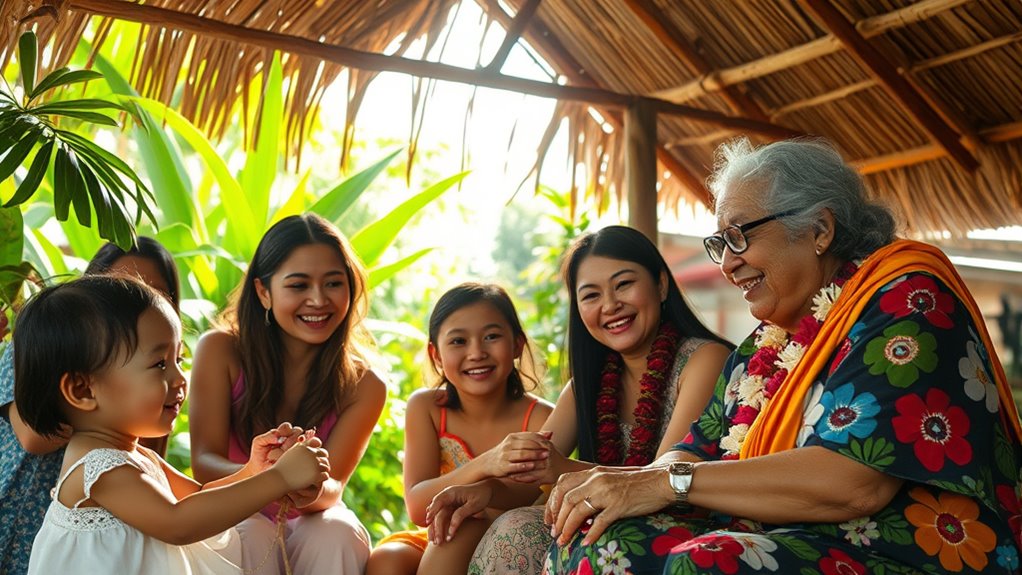
In the heart of Filipino culture, community support and adaptation in family life play an essential role in shaping relationships. You’ll notice that extended families often live close, fostering strong bonds and communal assistance.
Many households are three-generational, with grandparents actively involved in raising grandchildren and upholding traditions. As labor migration continues, families adapt by relying on remittances and extended relatives to care for children left behind.
Elders command respect and play significant roles in decision-making, ensuring cultural values are passed down. Family gatherings and cultural celebrations strengthen these ties, reinforcing support networks.
Through regular communication and home visits, even those abroad maintain their connections, showcasing a resilient family structure that thrives on cooperation and shared responsibility.
Frequently Asked Questions
How Do Filipino Customs Influence Modern Dating Practices?
Filipino customs greatly influence modern dating practices by prioritizing family involvement and respect.
You’ll find that traditional courtship rituals, like panliligaw, still resonate, as many couples seek family approval and maintain modesty.
While technology offers new ways to connect, respect and commitment remain central to relationships.
You might notice a blend of old and new customs, creating a unique dating experience that honors cultural values while adapting to contemporary lifestyles.
What Role Does Religion Play in Filipino Relationships Today?
Religion plays a significant role in Filipino relationships today. You’ll find that many Filipinos seek spiritual harmony with their partners, often participating in religious activities together.
The influence of Catholic teachings shapes your views on marriage, promoting fidelity and commitment. Community expectations can pressure you to adhere to traditional norms.
Additionally, local churches act as community hubs, fostering support and strengthening ties, making religion an integral part of relationship dynamics.
How Do Economic Factors Affect Marriage Decisions Among Filipinos?
Economic factors considerably influence your marriage decisions in the Philippines.
With rising costs associated with weddings and legalities, you might opt for cohabitation instead. If you face financial constraints or prioritize career stability, living together without formal marriage seems more feasible.
Additionally, the lack of divorce can deter you from committing due to potential financial risks.
As societal norms evolve, many of you’re choosing personal freedom over traditional marriage expectations.
Are Arranged Marriages Still Common in Contemporary Filipino Society?
Arranged marriages in contemporary Filipino society are like fading echoes of the past. While they still exist, especially in some cultural or religious contexts, they’re not as prevalent as before.
You’ll find that many Filipinos now prefer love matches, valuing personal choice over family arrangements. Despite this shift, societal expectations still loom large, influencing decisions about marriage and relationships in various ways.
Change is happening, but tradition still holds some sway.
How Does Social Media Affect Filipino Courtship Rituals?
Social media’s changed the landscape of Filipino courtship rituals considerably.
You can now express affection through digital serenades or love letters sent via messaging apps, retaining traditional romantic gestures in a modern way.
With dating apps, meeting potential partners has never been easier, allowing for more personal connections.
Communication has become instant, letting you share feelings without the constraints of traditional norms, ultimately blending old customs with contemporary practices.
Conclusion
You might think that Filipino history is just a distant memory, but it’s alive in every relationship today. Understanding how traditional family structures, colonial influences, and evolving dating norms shape your connections can deepen your empathy and communication. As you navigate modern challenges, remember that blending these rich cultural insights with contemporary values can create stronger bonds. Embracing this history isn’t just about looking back; it’s about forging a vibrant future in your relationships.
